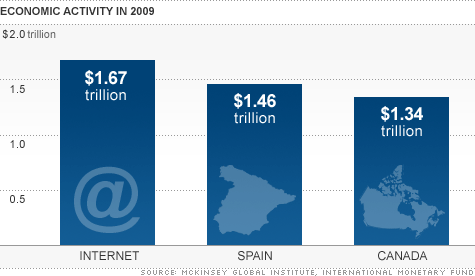Search News

NEW YORK (CNNMoney) -- The Internet has dramatically transformed business and culture over the last two decades. But what's it worth?
A group of researchers is trying to put a value on the Internet's contribution to the global economy -- and they think it's larger than the entire economies of Canada or Spain.
McKinsey Global Institute released a study Wednesday that claims the Internet accounts for roughly 3.4% of economic activity in 13 of the world's largest countries.
The Internet contributed about $1.67 trillion to global gross domestic product in 2009, the study's researchers found.
That edges just slightly past the entire GDP of Canada, which came in at $1.34 trillion that same year, and the $1.46 trillion economy of Spain.
Roughly 2 billion people now use the Internet and exchange $8 trillion each year through e-commerce.
"In two decades, the Internet has changed from a network for researchers and geeks to a day-to-day reality for billions of people," the study said.
And while the Internet's impact has also killed some jobs, it creates about 2.6 jobs for every one destroyed, McKinsey said.
"Companies using the Internet with a high intensity grow twice as quickly as low-intensity Web companies, export twice as much as they do, and create more than twice as many jobs," the researchers wrote.
In the United States alone, the Internet drove 15% of the country's economic growth between 2004 and 2009, thanks largely to its business-boosting effects. Internet maturity -- measured by local penetration and usage frequency -- also correlates closely with rising living standards and increased labor productivity, McKinsey found.
The study examined the G8 countries, along with Brazil, China, India, South Korea and Sweden. Those nations overall account for 70% of the global economy. Among those countries, the Internet contributed an average of 11% to gross domestic product during the five-year period the researchers studied. ![]()